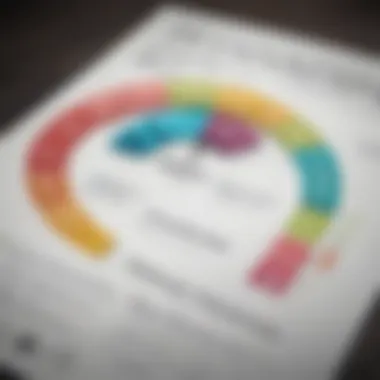Mastering Debt Consolidation: A Complete Guide


Intro
In today's complex financial landscape, understanding debt consolidation is becoming more crucial than ever. For individuals juggling multiple debts, from credit card balances to personal loans, finding an effective solution can feel like a daunting task. This guide will break down the intricacies of consolidating debt, shedding light on the various strategies available, their implications, and their effectiveness.
We’ll start by defining key terms that are often thrown around in finance circles. Grasping these terms is essential for anyone looking to manage their debts more effectively. From there, we’ll explore specific financial products that can assist in consolidation efforts.
Ultimately, readers will gain a comprehensive understanding of debt consolidation, arming themselves with actionable insights to make informed decisions. Let’s dive in and unpack this complex, yet essential, topic.
Understanding Debt Consolidation
Debt is a reality many face at some point in their lives, and dealing with it can be a real headache. Understanding debt consolidation is crucial because it offers a potential lifeline to those who feel overwhelmed by their financial responsibilities. It’s a way to simplify and streamline what might feel like an insurmountable financial maze. By grasping the nuances of this process, individuals can make more informed choices about their financial futures.
Debt consolidation isn’t just a one-size-fits-all approach; there are nuances in how it can be applied to different situations. Its effectiveness can vary widely depending on one's unique circumstances—whether that’s the types of debt being dealt with or the individual’s overall financial picture.
What is Debt Consolidation?
At its core, debt consolidation refers to the process of rolling multiple debts into a single loan. Imagine it like gathering all your bills into one basket to make it easier to manage. This often involves taking a new loan — usually at a lower interest rate — to pay off existing debts. The outcome? Instead of juggling several due dates and interest rates, you’re left with one, which can be a real game-changer in improving manageability.
Common methods of debt consolidation include personal loans, balance transfers, home equity loans, and even debt management plans. Each of these options has its pros and cons and can cater to different types of financial predicaments. Grasping these distinctions not only simplifies the repayment process but also opens the door to potentially lower overall interest rates, which could save money in the long run.
Why Consider Debt Consolidation?
Now, why should anyone even think about consolidating debts in the first place? The reasons can vary, but some key motivations often stand out:
- Reduced Monthly Payments: By consolidating, one may be able to lower their monthly payments. If the interest rate on the new loan is lower than the rates of existing debts, that monthly outflow may be reduced significantly.
- Simplified Management: Managing one payment is typically easier than juggling multiple ones. This can also lessen the mental burden of debt, freeing up emotional energy to focus on other priorities in life.
- Potential for Improved Credit Score: While initially, applying for a new loan might have a slight impact on your score, in the long run, successfully managing a single loan can improve credibility in the eyes of creditors. The key is to make timely payments, as that’s what ultimately leads to a higher credit score.
Consolidating debt can be a strategic move that not only relieves stress but opens pathways to more robust financial health.
In essence, debt consolidation isn't just about convenience; it's about creating a financial strategy that empowers individuals. It can provide the clarity and control many seek amid the chaos of multiple debts. By taking the time to understand the mechanics, benefits, and other contributors to debt, individuals are taking a significant step toward financial recovery.
The Types of Debt Consolidation Solutions
Understanding the various methods through which one can consolidate debt is crucial. Each solution brings its own set of advantages and considerations, often shaped by individual circumstances. Whether one chooses a personal loan or a debt management plan, knowing the landscape helps in making an informed decision. The choice not only affects one's financial situation today but reverberates throughout future financial endeavors.
Personal Loans
Personal loans are one of the most popular avenues for consolidating debt. When you take out a personal loan, you're essentially borrowing a lump sum which allows you to pay off multiple debts at once. This can lead to streamlining your payments into one monthly installment, which makes managing your finances a bit easier.
Benefits:
- Fixed Interest Rates: Unlike credit cards, personal loans often come with fixed interest rates, making it easier to budget.
- Set Repayment Terms: These loans have predetermined repayment timelines, usually between two to five years.
However, it's essential to keep in mind that not all personal loans are created equal. Interest rates can vary significantly based on individual credit scores. If you happen to have low credit, you might end up with a higher interest rate than what you were paying on your previous debts.
Credit Card Balance Transfers
Credit card balance transfers involve moving the debt from one credit card to another, usually one that offers a lower interest rate, often with an enticing promotional zero-interest period. This is a clever way to save money on interest in the short term.
Considerations:
- Introductory Rates: Many cards provide promotional rates for an initial period, but be aware of what happens after it ends.
- Fees: There might be a balance transfer fee, typically 3-5% of the total amount transferred.
If executed wisely, this method could provide a temporary reprieve from high interest. However, it won’t solve the underlying spending habits that may have led to the debt pile-up in the first place.
Home Equity Loans
Using a home equity loan is another route for debt consolidation. This option allows you to borrow against the equity you've built up in your home, often at a relatively lower interest rate. Given that your home serves as collateral, lenders might offer better terms compared to unsecured loans.
Pros:
- Lower Interest Rates: Typically much lower than personal loans due to collateral.
- Tax Deductible: In some cases, the interest paid can be tax-deductible. Check your local laws for specifics.
That said, this method carries significant risk. If you fall behind on payments, you could face foreclosure. Therefore, it's not just a financial decision but a serious lifestyle choice that affects your living situation.
Debt Management Plans
Debt management plans (DMPs) are structured repayment plans put together by credit counseling agencies. In this case, a counselor negotiates with creditors to potentially reduce interest rates and payments. Participants then make a single monthly payment to the agency, which distributes it to creditors.
Key Elements:
- Structured Payments: You work out a manageable payment plan over a set timeline, usually three to five years.
- Financial Counseling: Most programs include financial advice to help prevent future debt.
On the downside, DMPs may have a negative impact on your credit score, as you might have to close down your existing credit accounts. It's also important to ensure that the counseling agency you choose is a reputable one to avoid scams.


Each of these debt consolidation solutions has its own merits and weaknesses. Careful assessment of the options is imperative to avoid falling into a worse financial situation. Always do your due diligence, consider factors such as interest rates, repayments, and potential risks before taking any action.
"Remember, debt consolidation is not a magic bullet; it requires discipline and foresight to ensure it leads to financial health."
Analyzing Your Financial Situation
Assessing your financial situation is like taking inventory before a big purchase; you want to understand what you have, what you owe, and how that all stacks up. This section serves as the foundation of your journey towards effective debt consolidation. Knowing the ins and outs of your finances enables you to make smarter decisions. The clearer your financial picture, the better equipped you are to explore your options and take appropriate action.
Assessing Total Debt
When it comes to consolidating debt, the first order of business is to tally up your total outstanding debts. This includes credit card balances, personal loans, and any other liabilities you might have. Think of it like compiling a detailed scoreboard of your financial landscape. You can't adequately plan a comeback if you don't know the current score.
Consider the following points when evaluating your total debt:
- Categorize Your Debts: Sort your debts into categories like secured, unsecured, and revolving credit. This categorization helps you understand where most of your liabilities lie and highlights high-interest debts that need immediate attention.
- Magnitude Matters: Not all debts are created equal. Higher amounts usually warrant a more strategic approach. Prioritize focusing on loans or credit cards with higher interest rates first.
- Keep Records: Make a list, perhaps an Excel sheet or a simple notebook, where you can jot down your debts, interest rates, and due dates. This helps you visualize the larger picture.
Evaluating Interest Rates
Once you’ve assessed your total debt, the next step is to look closely at the interest rates attached to those debts. Interest rates determine how much more you'll pay over time, and a high rate can feel like trying to swim upstream. Evaluating these rates allows you to strategize your consolidation effectively.
Consider these aspects when evaluating your interest rates:
- Average Rates: Know whether you're paying above-average rates for your debts. If your interest rates are higher than the national average, it might be time to consider a different approach.
- Floating vs Fixed: Determine whether your debt has a fixed or floating interest rate. Fixed rates remain constant, while floating ones can change, potentially increasing your payments unpredictably.
- Potential Savings: Calculate what your total payments would look like if you consolidated at a lower rate. Sometimes just a few percentage points can lead to significant savings over time.
Understanding Your Credit Score
Your credit score is more than just a number; it's your financial reputation. It can unlock doors to better loan options and more favorable rates down the line. Understanding it fully helps you navigate the debt consolidation arena more effectively.
Here’s how to break it down:
- Check Your Score Regularly: Credit scores can fluctuate. Make it a point to check yours before you start tackling consolidation options. Knowing your score can guide you toward the best options available to you.
- Factors Affecting Your Score: Familiarize yourself with what influences your credit score. Payment history, credit utilization, and the length of your credit history all play substantial roles. This understanding can help you make improvements that pave the way for better consolidation choices.
- Impact of Consolidation: Realize that consolidating debt might temporarily affect your credit score. While this could happen due to new credit inquiries, long-term benefits like reduced debt-to-income ratios can outweigh short-term dips.
"Understanding the nuances of your financial situation sets the stage for successful debt consolidation. Take the time to address each aspect meticulously."
Each of these components — total debt, interest rates, and credit score — ties together like threads in a fabric. They create the larger narrative of your financial health, guiding you as you explore your options for debt consolidation.
Exploring the Benefits of Debt Consolidation
Debt consolidation can often feel like a lifeline for individuals drowning in a sea of multiple debts. It’s about more than just simplifying your payments or maybe snagging a lower interest rate; it’s fundamentally about regaining control over your financial life. When managing numerous debts, juggling various due dates and payment amounts can create unnecessary stress. That’s where the allure of debt consolidation shines, revealing several key benefits.
Simplified Payments
One of the primary advantages of debt consolidation is the simplification of your payment structure. Imagine having to remember different due dates for multiple credit cards, personal loans, and other debts. It can become quite the mental load. By consolidating these debts into a single loan, you transform that labyrinth of due dates into just one.
- Single Payment: Instead of managing several payments, you will be only paying one monthly payment.
- Easier Management: Consolidation helps you keep track of your payments, reducing the chance of missing one and incurring late fees.
This streamlined approach not only alleviates stress but also enables better financial management overall. It means less time dedicated to administrative tasks—after all, who wants to spend their evenings drowning in bills?
Potential for Lower Interest Rates
When it comes to debts, the interest rate can sometimes be the elephant in the room. If you’re using high-interest credit cards as a primary form of managing expenses, the financial implications can add up significantly over time. This is where debt consolidation could give you a fighting chance.
Often, debt consolidation loans come with lower interest rates compared to those nasty credit card rates. This potential reduction in interest can have several noteworthy impacts:
- Savings on Interest Payments: By consolidating high-interest debts into a lower-interest loan, you might save money on interest payments in the long haul.
- Faster Debt Repayment: Lower interest rates might also allow you to pay off the principal debt quicker since a larger portion of your payments goes toward reducing the original sum rather than the interest.
However, it’s crucial to do your homework here. Ensure the new interest rate is truly lower than what you’re currently paying, and be wary of any hidden fees that could offset potential savings.
Improved Credit Score Over Time
Let’s not forget about the credit score. Many folks think of this number as just a three-digit figure. In reality, it plays a pivotal role in many aspects of financial health. Consolidating your debts can help improve your credit score, but it’s a gradual process. Here’s how it usually unfolds:
- Reduced Credit Utilization: If you pay off credit cards with a consolidation loan, you're lowering your overall credit utilization ratio, which can positively influence your score.
- Timely Payments: With simplified payment structures, you’re more likely to make payments on time, a major factor in maintaining a strong credit score.
"Improving your credit score isn’t an overnight task. It involves consistent, responsible financial behavior over time."
That said, while consolidation can thus be a stepping stone to a healthier credit profile, ongoing financial discipline is the real key to success.
In summary, while there are several factors at play when considering debt consolidation, the benefits like easier payment management, potential savings on interest rates, and positive impacts on your credit score can make it a powerful tool. As with any financial decision, digging deeper into your own financial situation is essential.
Identifying the Risks and Drawbacks
Identifying the risks and drawbacks associated with debt consolidation is crucial for anyone thinking of taking this route. Many individuals jump into consolidation, believing it to be a panacea for their financial woes, without fully grasping the implications. Understanding these potential pitfalls can save you from making decisions that could ultimately complicate your financial situation further.


Increased Total Loan Cost
One of the primary concerns with debt consolidation is the chance of ending up with a higher total loan cost than you initially had. While combining several loans into one can reduce the number of payments due each month, it doesn't necessarily equal savings. For instance, if you consolidate a high-interest credit card debt into a personal loan with a longer term, you could be paying more in interest over time. It’s like trading a small fire for a larger campfire; it might seem manageable at first, but it could easily get out of control.
- Longer Repayment Period: Extended repayment terms impact the total interest paid. A loan that lasts ten years might feel easier on the wallet each month, but that length often means you'll pay more overall.
- Fees and Charges: Many debt consolidation loans come bundled with fees—origination fees, annual fees, and more. Watch out, or you’ll find these charges sneaking up on your budget, like pesky weeds in a garden.
Impact on Credit Score
Debt consolidation can have different effects on your credit score, depending on how you manage your new loan or payment plan. Initially, consolidating debt might result in a temporary drop in your score. This is often due to the hard inquiry from loan applications and changing your credit utilization ratio. It’s essential to keep in mind that a drop in credit scores can make things tougher when you’re trying to secure new credit or favorable interest rates.
- Credit Utilization Ratio: By consolidating debts, especially those on credit cards, you might lower that ratio, which can have a positive effect over time.
- Payment History: As long as you make your payments on time—no ifs, ands, or buts—you can offset some of the initial negative impacts fairly quickly.
Potential for Debt Spiral
Another risk that often flies under the radar with debt consolidation is the potential for falling into a debt spiral. This happens when individuals, buoyed by the simplicity of a single payment, begin to accumulate new debts. It’s as though one has been given a pristine slate and, instead of cherishing it, they start scribbling all over again. The ease of managing one consolidated loan can lead you to forget the reason you consolidated in the first place.
- Old Habits Die Hard: If consolidation isn’t paired with behavioral changes regarding spending, you might end up racking up new debts while still paying off the consolidated one.
- Emotional Spending: The relief from simplifying debts can cause some people to dismiss their financial habits, leading to impulsive purchases that can sabotage the very relief they sought.
In navigating the landscape of debt consolidation, awareness of these risks and drawbacks is the first step towards making sound financial choices. Consider each factor carefully and arm yourself with knowledge before taking a decisive leap.
In summary, while debt consolidation presents various advantages, it’s imperative to assess the associated risks meticulously. A careful analysis of your situation alongside these highlighted considerations can help illuminate the path towards sound financial decisions.
The Step-by-Step Process of Consolidating Debt
When one finds themselves mired in the thick of multiple debts, the path to financial freedom can often seem obscured by confusion and anxiety. This is where understanding the step-by-step process of consolidating debt becomes crucial. By breaking down the journey into digestible parts, individuals can more confidently navigate the intricacies involved. Each step not only clarifies the entire process but also ensures that the appropriate measures can be employed for effective debt management.
Consolidation isn’t a one-size-fits-all solution, and knowing how to proceed can mean the difference between regaining financial stability and falling deeper into debt. Here’s a dive into the essential components of this journey.
Selecting the Appropriate Method
The first step involves choosing the right method for consolidating debt. There are multiple options available, each suited to differing financial situations. Individual circumstances dictate the appropriate approach, and this choice can significantly influence the outcome. Here are a few methods to consider:
- Personal Loans: These can provide the funds needed to pay off several debts at once. They often have lower interest rates compared to credit card debt.
- Credit Card Balance Transfers: If a person has high-interest credit cards, transferring that balance to one with a 0% introductory rate can save money.
- Home Equity Loans: This involves borrowing against one’s home, typically at lower rates. It’s vital to tread carefully here, though, as home equity loans can put one’s property at risk.
- Debt Management Plans: Working with a credit counseling agency can be beneficial, helping to consolidate payments and possibly reducing fees or interest rates.
The specific method chosen hinges on multiple factors, such as the total debt amount, current interest rates, and one’s credit score. Explaining these options to potential consolidators is pivotal for a well-informed decision.
Applying for Loans or Programs
Once the appropriate method has been selected, the next step involves the application process. This phase can feel daunting, but arming oneself with knowledge makes it far more manageable. Here are important elements to keep in mind:
- Research lenders thoroughly: Not all lenders offer similar terms. Identify and compare a few options to find the best fit.
- Gather necessary documentation: Depending on the choice, documents like proof of income, credit reports, and details of existing debts may be required.
- Check credit score: A reasonable score can make securing lower interest rates easier, while a poor score may lead to unfavorable terms.
- Submit applications: Be prepared to provide complete and accurate information to avoid delays. Many lenders allow online applications, which can streamline the process.
Upon applying, it’s important to be patient. The review and approval might take a bit of time, but being transparent about one’s financial situation typically yields better results.
Implementing a Repayment Plan
After securing the necessary funds, it’s time to craft a repayment plan. This is where discipline and commitment come into play. Not having a clear plan can lead to a cycle of debt repetition. Here’s how to construct a robust repayment strategy:
- Set a budget: Evaluate monthly expenses and income. This will help ascertain how much can be allocated towards paying off the consolidated debt.
- Choose payment strategies: Whether opting for the snowball method (paying off smallest debts first) or avalanche method (tackling highest interest rates first), a clear strategy provides motivation and a sense of accomplishment.
- Consider automation: Setting up automatic payments can prevent missing due dates and incurring late fees.
- Track progress: Regularly revisiting the repayment plan can help keep one’s finances in check and serve as encouragement when milestones are met.
"A budget is telling your money where to go instead of wondering where it went."
Considerations After Consolidation
After consolidating your debts, it’s not all smooth sailing. In fact, this juncture is when the real work begins. While consolidating can offer temporary relief, the next steps are crucial for ensuring long-term financial health. It’s paramount to maintain a keen eye on how debt consolidation impacts your overall financial trajectory. Two key areas that call for attention are maintaining financial discipline and monitoring your credit score.
Maintaining Financial Discipline
Once you’ve taken the important step of consolidating your debts, it’s vital to buckle down and stick to a well thought-out plan. The roads after consolidation can get bumpy if you’re not committed to changing your spending habits or actively managing your finances.
Establishing a budget should be at the core of your financial strategy moving forward. Take stock of your income and outgoings, ensuring that you allocate enough funds to cover your debt repayment commitments. Here are a few strategies that might help:
- Create a Realistic Budget: Outline fixed expenses, variable costs, and discretionary spending. Make sure debt payments are prioritized.
- Cut Unnecessary Expenses: Review your spending habits and trim down on non-essentials.
- Use Cash-Only Methods: If credit cards are your Achilles' heel, limit their use. Consider cash for purchases to avoid adding to your debt pile again.
- Set Financial Goals: Short-term and long-term goals can motivate you to keep your spending in check and remain focused on proper repayment.
Staying disciplined isn't easy, but it is essential. Just remember: the habits you cultivate post-consolidation can either solidify your financial recovery or lead you right back into the quicksand of debt.
Monitoring Your Credit Score
Your credit score can feel like an ever-watchful guardian overseeing your financial decisions. After consolidation, it’s essential to monitor this score closely, as it can influence your ability to secure future loans and affect interest rates on existing debts.
The aggregated debts you had before could lead to fluctuations in your credit score. Here’s why keeping an eye on your score matters:
- Understanding Its Components: Your score is influenced by payment history, amounts owed, length of credit history, new credit, and types of credit used. Post-consolidation, ensure that your payment history stays pristine to boost your score.
- Regular Check-Ups: Use tools or websites to check your credit score regularly for any inaccuracies. Errors can happen, and rectifying them promptly can make a difference.
- Responding to Changes: If your score isn’t moving in a positive direction, investigate the cause immediately. Are you making late payments? Is your credit utilization too high? The sooner you address these issues, the better.


“The best time to plant a tree was twenty years ago. The second best time is now.” - Chinese Proverb
As you embark on this journey after consolidating, remember that financial discipline and credit vigilance are your new best friends. Leverage these considerations to safeguard your financial future and prevent slipping back into debt.
Alternatives to Traditional Debt Consolidation
When one thinks about debt consolidation, the mind often drifts toward popular methods like personal loans or balance transfers. However, stepping outside the conventional route can sometimes unveil solutions that fit one's financial landscape better. Exploring alternatives to traditional debt consolidation is not merely a sidebar discussion; it addresses the vast array of choices available, each with its own unique benefits and considerations that can profoundly affect one's financial path.
Debt Settlement
Debt settlement is often overlooked. This method involves negotiating with creditors to reduce the total amount owed. It’s a pragmatic solution for those drowning in debt but lacking the means to pay it off in full. This option usually results in a one-time lump sum payment to your creditors, which is often significantly lower than the original debt amount.
- Pros:
- Cons:
- Immediate relief from the burden of large debts.
- Possibility of settling debts for less than what is owed, which can be a financial lifesaver.
- A good option for those who can gather a lump sum, despite having little to no income.
- Not all creditors will agree to a settlement; it depends on their policies.
- It can lead to negative marks on your credit report for the settled debts.
- There might be tax implications on the forgiven debt, as the IRS sees this as income.
For those entangled in overwhelming credit card debt or medical bills, debt settlement can provide a tailored alternative but comes with its own caveats. Always crunch the numbers and perhaps consult a financial advisor to evaluate if this path resonates with your long-term goals.
Bankruptcy Considerations
Bankruptcy is a term most folks dread, understandably so. It suggests deep financial turmoil but can serve as a fresh start for those truly unable to meet their obligations. It wipes out most debts, allowing you to rebuild your financial future. However, understanding the nuances is crucial.
- Chapter 7 Bankruptcy:
Think of this like a clean slate. You have to qualify based on income and expenses, but if you do, most unsecured debts can disappear, leading to a sense of relief. Assets might be liquidated, though, which is a major consideration. - Chapter 13 Bankruptcy:
This is where you get to keep your assets while creating a repayment plan over three to five years. It’s like making peace with your debts while still being responsible.
Key Considerations:
- Long-lasting Effects:
A bankruptcy will stay on your credit report for years, which complicates future borrowing. - Legal Involvement:
You’ll need to seek legal counsel, which can be an added expense, yet necessary to navigate the waters properly.
Ultimately, whether you’re considering debt settlement, thinking about bankruptcy, or examining other alternatives, the upshot is clear: fully understand all facets of each option. These alternatives can grant you a chance to reclaim your financial standing, but they come with significant trade-offs. Careful analysis and, often, the advice of financial professionals can lead to smarter choices—in a world where one wrong turn can lead to more financial distress.
When to Seek Professional Help
Knowing when to seek professional assistance in your debt consolidation journey can be a turning point. It’s not about admitting defeat; rather, it shows a commitment to tackling your financial issues head-on. Professionals can provide tailored strategies that might not be apparent to someone wading through the complexities of their financial situation. They can act as a guiding light in those murky waters, bringing expertise that can make all the difference in managing substantial debt.
Identifying Signs of Financial Distress
Recognizing the signs of financial distress is crucial. Here are some key indicators:
- Frequent Late Payments: If you often miss bills, it’s a red flag.
- Using Credit for Necessities: Relying on credit cards for day-to-day expenses rather than manageable purchases indicates trouble.
- Only Paying the Minimum: Consistently only paying minimum amounts on your credit cards is like putting a band-aid on a wound without addressing the underlying issue.
- Accumulation of New Debt: If your debts keep piling up rather than decreasing, it's essential to assess your situation more critically.
It’s easy to get lost in the daily hustle and overlook these warning signs. Keep an eye out for recurring patterns in your financial habits. If any of the above resonate with you, it might be time to consult a financial advisor who specializes in debt management.
Choosing the Right Advisor
Choosing the right advisor is instrumental in your debt consolidation path. Here’s what to consider:
- Credentials Matter: Check their qualifications and experience. An advisor with a solid background can often provide insights that make a significant impact.
- Transparency is Key: Look for someone who is open about their fees and practices. You want an advisor whose interests align with yours.
- Client Reviews: Seek feedback from previous clients. Their experiences can shed light on what you can expect.
- Personal Rapport: Comfort and trust are crucial. You should feel at ease discussing your financial struggles openly.
In summary, knowing when to seek help and how to choose the right advisor can significantly influence your path to financial stability. Sometimes you need a map to navigate a complex landscape – and that map is often best drawn by someone with experience.
Real-life Case Studies
Real-life case studies serve as a crucial element in understanding the impact and effectiveness of debt consolidation strategies. They offer tangible examples that highlight how different approaches to debt can yield varying results based on individual circumstances. By examining these stories, readers can identify strategies that resonate with their situations, allowing them to glean insights on which methods might be most effective.
Moreover, these case studies illuminate the diverse experiences of individuals, showcasing not just the successes but also the struggles faced during the debt consolidation process. This dual perspective is essential for readers to grasp the true nature of debt management and the potential hurdles they may encounter along the way.
Successful Debt Consolidation Stories
One of the notable successful stories in debt consolidation comes from a woman named Emily. After racking up credit card debt due to unforeseen medical expenses, Emily was at a point where her finances felt like a heavy weight on her shoulders. With multiple cards to manage and high-interest rates eating into her budget, she decided to consolidate her debts through a personal loan.
After researching various lenders, she found a reputable bank offering a low-interest rate on personal loans. Emily took the plunge and secured a loan that covered all her existing debts. Over time, she shifted from juggling several payments a month to one manageable, lower payment. The newfound stability allowed her to save money, and she could focus on rebuilding her credit score, alongside her financial health.
Another story worth mentioning is that of Mark and Sarah, a couple who took advantage of a home equity loan to consolidate their debts. Both were burdened with student loans and credit card debt, so they visited a financial advisor who recommended leveraging the equity in their home.
After properly assessing their financial standing, they found the home equity loan provided a lower interest rate than their existing debt. By using this method, they not only simplified their payment process but also set them on the path of paying off their debt faster than previously anticipated.
Lessons from Failed Attempts
While stories of success can offer motivation, it’s vital to also learn from failed attempts in debt consolidation. A man named Jacob presents a cautionary tale. In his eagerness to rid himself of debt, he rushed into a balance transfer credit card offer without understanding the terms and conditions adequately. Initially, it seemed like a golden opportunity; however, Jacob overlooked the fact that high fees were involved after the promotional period ended.
With this strategy, his initial debt was not only unchanged but compounded due to the missed payments on the transferred balance. His credit score took a hit, and he found himself even deeper in financial trouble, when he faced interest rates climbing over time.
Another instance is that of Lisa, who attempted to settle her debts without proper guidance. She engaged with a debt settlement company that promised quick fixes. However, she soon realized it was a trap laden with hidden fees. Furthermore, when her creditors weren't persuaded to settle, she faced legal actions, leaving her worse off than before.
In both cases, these failed consolidation attempts reflect the importance of thorough research and understanding the financial products one engages with. They serve as a reminder that while debt consolidation can be a helpful tool, it must be approached with caution and proper planning.
Learning from both success and failure in debt consolidation can equip individuals with the knowledge to make informed choices.



